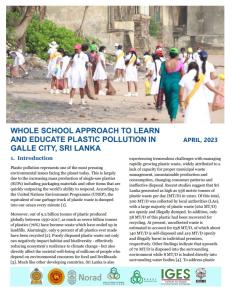Plastic pollution represents one of the most pressing environmental issues facing the planet today. This is largely due to the increasing mass production of single-use plastics (SUPs) including packaging materials and other items that are quickly outpacing the world’s ability to respond. Social, cultural and economic shift in addition to the promotion of technical and scientific innovations are required to address and ultimately prevent plastic pollution. Doing so will necessitate a shift in lifestyle choices and consumption patterns, as well as changes individual actions and behaviours to achieve a society that makes use of fewer plastic products. Despite these achievements, practical application of international and national policies, curricula, learning and practices for promoting ESD have yet to become mainstreamed in Sri Lankan schools.
As such, this paper seeks to present the experience of the model education project implemented by the IGES Centre Collaborating with UNEP on Environmental Technologies (CCET), the Ministry of Environment, Sri Lanka, the Secretariat of the Basel, Rotterdam and Stockholm Conventions (BRS Secretariat) and HELP-O, a local non-governmental organization (NGO) in Galle City. This model education project is being implemented as part of an umbrella project entitled “Marine litter and microplastics: promoting the environmentally sound management of plastic waste and achieving the prevention and minimization of the generation of plastic waste” (BRS-Norad-1), which is being implemented in Sri Lanka and Ghana, and also features global activities. The BRS-Norad-1 project is financed by the Norwegian Agency for Development Cooperation (Norad) with additional funding provided by the Government of the Netherlands. In Sri Lanka, the project is jointly implemented by the Ministry of Environment, Sri Lanka, IGES and the BRS Secretariat. The model education project is closely engaging with three pilot schools in Galle City, working both to expand teaching and learning opportunities around action-based education, as well as providing options for students and teachers to get involved in plastic waste management and related sustainability initiatives. The ultimate goal of the project is to enhance educational curricula and learning methods to support teachers and students with the development of skills, knowledge, and behavior changes for reducing, and ultimately preventing plastic pollution in schools and local communities across Sri Lanka.

